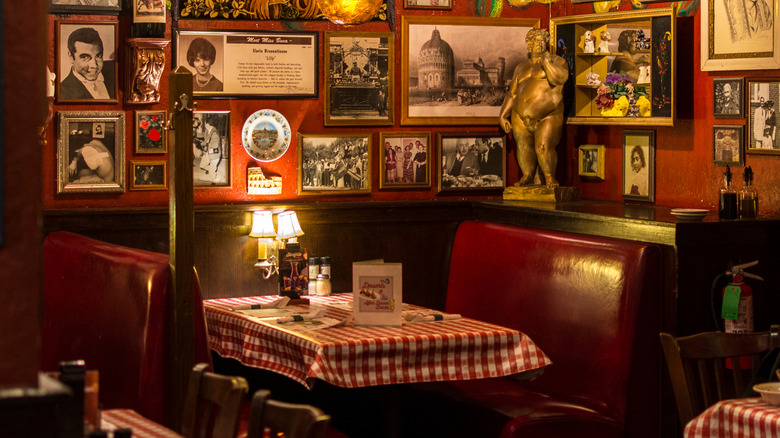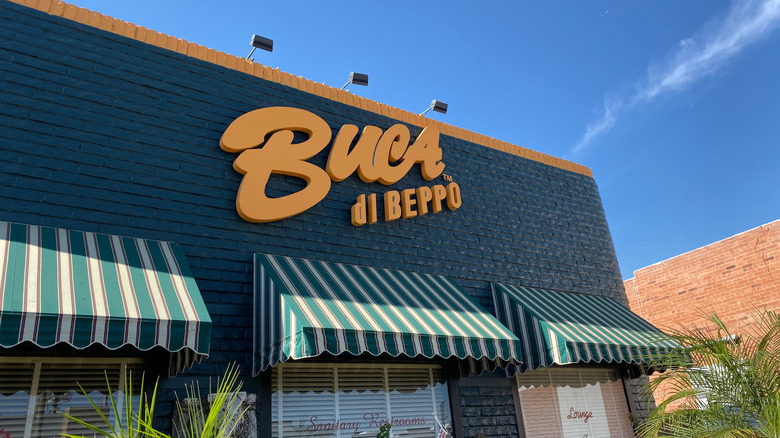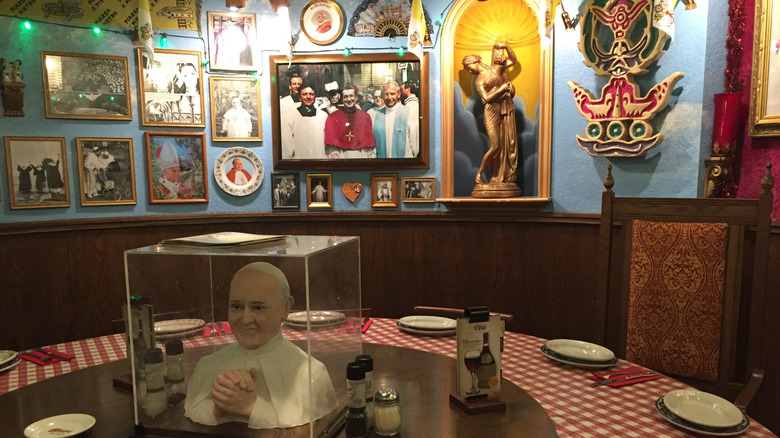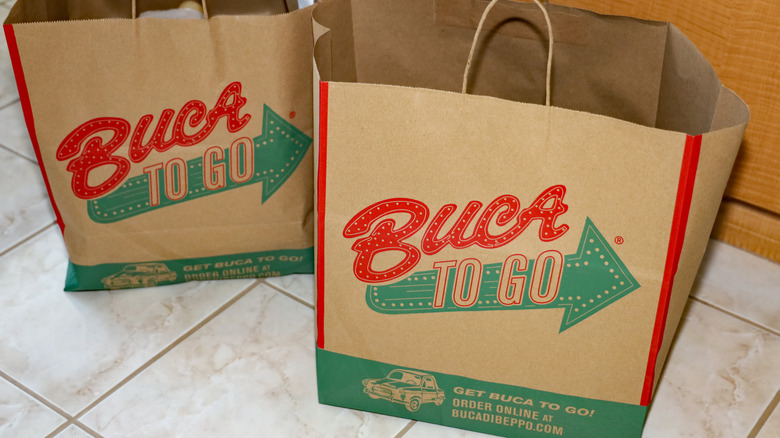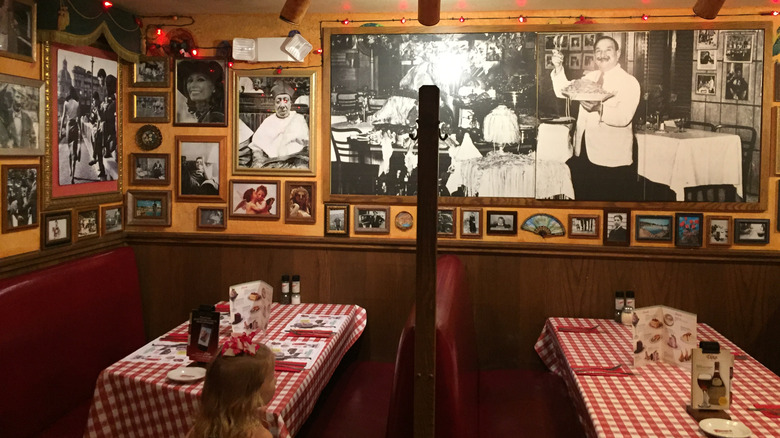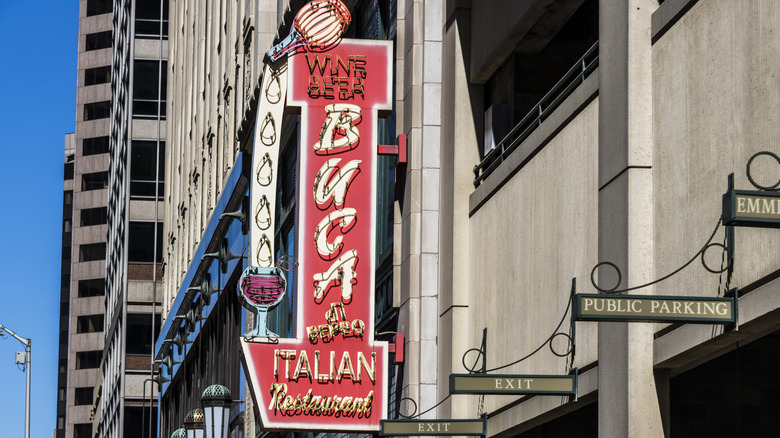The Only Recap Of Buca Di Beppo's Downfall You Need
Known for its big portions and even bigger personality, Buca di Beppo has been a staple of American (or Italian-American, depending on how you see it) dining since 1993. That's when founder Phil Roberts opened his first location in the basement of a Minneapolis apartment building, with no idea that it would someday become a household name.
As an homage to the Northeast red sauce joints he loved, Roberts filled his Midwestern restaurant with an eclectic assortment of decorations meant to evoke nostalgia, whimsy, and a good laugh: Strings of Christmas lights swung over tacky velvet paintings, while black-and-white photos of boxers eating spaghetti hung behind a bust of the pope. And the food was equally over the top, served family style on generous platters, most often covered in melted mozzarella and housemade marinara. Guests loved it all, and Buca di Beppo was an instant hit.
By 1999, business was booming. There were Buca di Beppo locations across the country, many with a line out the door, and celebrity endorsements. When the restaurant chain went public, its stock prices surged. But, beneath the Chianti-fueled celebrations, trouble was brewing. Over the next two decades, the company would be hit with a series of scandals, leaving it especially vulnerable to the challenges all restaurants faced in 2020.
From prison sentences to bankruptcy to coming back from the brink, the history of Buca di Beppo is as long and winding as spaghetti. Pull up a seat, and let's dig in.
Buca di Beppo's original CEO did not share its founder's creative vision
Phil Roberts and his partners may not have intended for Buca di Beppo to be a national chain, but early success quickly warmed them to the idea. To take the company national and eventually go public, they brought on Joseph Micatrotto as CEO. Micatrotto, in turn, brought his own ideas for what Buca di Beppo could and should be.
Micatrotto didn't share the founder's love of tongue-in-cheek kitsch and instead saw Buca as a way to share the culture and cuisine of his Italian heritage. He set out to infuse the brand with Old World authenticity, believing it would help nostalgic customers connect to it. He invented a story tying the name to his grandfather's, and toned down Roberts' over-the-top decor. He even went so far as to co-write "Into the Sauce," Buca di Beppo's first cookbook, claiming some of Chef Vittorio Renda's recipes as his family's own.
While Micatrotto's approach may have helped the restaurant chain expand, it did so at a cost. Tensions were rising at Buca di Beppo's corporate headquarters, and in 2003, both Roberts and Renda left the company.
Following a successful IPO in 1999, the company prioritized profits
Buca di Beppo went public in 1999, and its stock immediately surged. What followed is a tale as old as time under capitalism.
After its successful IPO, the company seemed on a mission to boost profits by any means necessary, increasing total revenues by 88% within a year. It acquired another Italian chain, Vinny Testa's, and operating margins increased. By 2000, Buca was selling more Chianti than any other restaurant chain in the country. In 2001, it expanded its family-style menu to offer baked specialties such as stuffed shells, manicotti, cannelloni, and baked ravioli. It was swiftly becoming the face of red-sauce Italian-American cuisine, and making a lot of money doing it.
With CEO Joseph Micatrotto at the wheel, Buca di Beppo drove full-speed toward maximum profitability — and further from founder Phil Roberts' original creative vision. By 2003, in a move that went against Roberts' desire to foster a place where people would linger and luxuriate in large groups, Micatrotto had begun to open some of the full-service restaurants for lunch. What's more, in an attempt to court smaller parties, individual portions were added to the menu. Business was booming, but it appeared to be losing some of what differentiated it in the first place.
Several executives were indicted for fraud, and the company was sold
In 2006, Buca di Beppo made a different kind of news headline when three of its top executives — CEO Joseph Micatrotto, CFO Greg Gadel, and controller Daniel Skrypek — were indicted for multiple counts of fraud. The trio, who at the time spearheaded 104 Italian restaurants in 28 states, were found guilty of inflating Buca's income, and also embezzling hundreds of thousands of dollars for their own personal use.
From 2000 to 2003, Micatrotto ran a scam wherein he improperly billed the company and then used reimbursements to pay for personal expenses like dog kenneling and the remodeling of several homes. CFO Greg Gadel, meanwhile, received undisclosed compensation that he put toward family vacations and strip-club outings.
In the aftermath of the scandal, Buca di Beppo's stock plummeted, and it was delisted from Nasdaq. It sold the 11 locations of Vinny T's in 2006 and, two years later, filed for Chapter 11. It would have been done for good if it weren't for Earl Enterprises, Planet Hollywood's parent company, stepping in at the last hour to purchase the chain out of bankruptcy.
After hitting its peak in 2014, Buca di Beppo began closing locations
For a short time, Buca di Beppo appeared on the road to recovery. Robert Earl, Planet Hollywood's founder and Buca's new owner, was on board with Phil Roberts' original plans for an over-the-top, more-is-more dining destination. Under Earl's leadership, the restaurant chain returned to its roots as a private and profitable company. It was, once again, less concerned with authenticity than with offering marinara-loving guests a memorable and enjoyable night out.
By 2014, Buca di Beppo had 95 locations around the country, with the highest-grossing in Honolulu, where it was the obvious pick for those craving an old-school Italian-American meal, without having to resort to the best jarred marinara sauce. However, the comeback was short-lived. By 2019, that number of restaurants had dipped to 77, and sales were steadily slipping every year. A combination of changing trends and ongoing legal troubles was working against the once-loved chain, and despite management's best efforts to get it back on its feet, it appeared that Buca di Beppo's glory days were gone.
A series of class action lawsuits accused Buca di Beppo of wage theft
Buca di Beppo was already on shaky ground in 2017, when it was hit with a class action lawsuit and another wave of bad press. That year, the staff of its Times Square location alleged that the restaurant chain had failed to pay its workers minimum wages and overtime pay. Employees accused their managers of requiring them to clock out and then continuing to work, and refusing to pay when billable hours crept beyond the legal limit.
A few years later, employees of a Los Angeles County location lobbed similar complaints, stating that Buca di Beppo had not paid all wages earned, including overtime, reimbursement for work expenses, compensation for missed breaks or meals, and sick leave. Additionally, the staff reported a lack of suitable seating or rest facilities, proper wage statements, and timely, uninterrupted breaks.
On their own, these lawsuits may not have done much to knock Buca di Beppo down the list of America's favorite Italian chains. But they were not the company's only problems, of the legal variety or otherwise.
A 2018-2019 data breach brought more legal troubles
In 2019, Earl Enterprises (which then owned and operated Buca di Beppo) was sued for failing to prevent a 10-month data breach that impacted over 2 million customers. According to the class action suit, third-party criminal attacks involving malware compromised credit card information at certain locations of Buca di Beppo, Planet Hollywood, Earl of Sandwich, Chicken Guy, Tequila Taqueria, and Mixology 101. A month after the breach was discovered via a batch of stolen credit cards for sale on the dark web, the company admitted fault.
While the incident did not only pertain to Buca di Beppo, it undoubtedly dealt another blow to an already faltering business. The chain was struggling to maintain credibility and its bottom line when it entered 2020, the catastrophic year that would change restaurants forever. Eateries across the globe were about to face unprecedented challenges, and as it grappled with the fallout from legal battles and dropping sales figures, Buca di Beppo was particularly ill prepared.
COVID-19 upended Buca di Beppo's business model
Restaurants built on ambiance and family-style dining are not built to weather a worldwide pandemic, but in 2020, Buca di Beppo gave it a good try. It updated operations to offer more to-go orders via delivery apps, and even turned some of its locations into ghost kitchens, with at least one restaurant in Utah acting as an outpost for MrBeast Burger and others transforming into Wing Squad, an offshoot by parent company Earl Enterprises that offers eye-catching branding and a casual, more affordable menu.
Unfortunately, these efforts were not enough to weather the storm, and Buca di Beppo became an example of how COVID-19 impacted the restaurant industry for good. When it once again filed for bankruptcy in 2024, Chief Restructuring Officer William Snyder cited financial trouble stemming from the pandemic. Sales had steadily declined and, from 2020 to 2024, the chain shuttered 30 restaurants, including 13 locations in a single week. It appeared that, without the over-the-top atmosphere that customers loved, demand for Buca di Beppo's famous meatballs and other red-sauce specialties wasn't enough to keep the business afloat.
Negative sentiment grows amid rising costs and changing culture
When it first opened in 1993, Buca di Beppo's brand of irreverent kitsch felt novel, and its massive portions were celebrated as an incredible deal. However, 30 years later, neither of those selling points are what they once were.
In the age of social media, over-the-top decor is nothing new. A place must be willing to evolve if it wants to stand out, and for the most part, Buca's interiors have remained unchanged for decades. Meanwhile, according to online reviews, the quality of the food has slipped. Who cares if the portions are large, if you don't want to eat it?
Critics on TikTok deride Buca di Beppo's "crunchy alfredo" and "overcooked" spaghetti. "They have ... completely sold out to the typical 'Corporate American Restaurant,'" reads one Yelp review of a Colorado location. On TripAdvisor, meanwhile, a patron of the Buca di Beppo in Roseville, California, pulls no punches: "I have never had such miserable Italian food! ...DON'T WASTE YOUR MONEY HERE."
Speaking of money, perception of Buca's value has also changed, with rising costs leaving a bad taste in diners' mouths. One goes so far as to warn on TripAdvisor: "Get a loan or stay home!"
Buca di Beppo filed for bankruptcy again in 2024
Blaming "limited customer demand" during the COVID-19 pandemic, Buca di Beppo filed for bankruptcy a second time in August 2024. It appears that, despite attempts to turn things around, the company could not recover the revenue it lost to nationwide lockdown restrictions. It entered Chapter 11 with $10 million in debt, a number that reportedly includes $1.36 million in unredeemed gift cards.
As part of its restructuring, Buca di Beppo closed more underperforming locations, leaving it with 44 restaurants at the end of 2024. At the time of writing, there are currently only 40 Buca di Beppo locations across 13 states — but don't count the company out just yet. In November 2024, Main Street Capital Corporation (which loaned Buca $47 million back in 2015) announced that it would buy the restaurant chain out of bankruptcy for $27 million. Under new leadership, can Buca di Beppo make another comeback? After the roller coaster ride it's been on thus far, we'll say, anything is possible.
